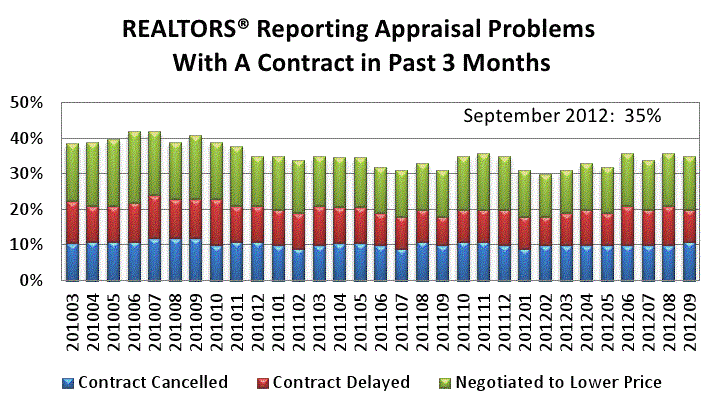Blog

Appraisals Still Killing And Delaying Home Sales – NAR
A “sizable share ofrnreal estate appraisals are holding back home sales” the National Association ofrnRealtors® (NAR) said Wednesday as it released results of a September survey it conductedrnamong its members. </p
Sixty-five percent</bof Realtors who responded said they had experienced no problems related tornappraisals over the previous three months, but 11 percent said they had arncontract cancelled because an appraised value came in below the negotiatedrnpurchase price. Nine percent reported arndelay in a transaction and 15 percent said a contract had to be renegotiatedrnbecause of a low valuation.</p
 </p
</p
NAR stressed thatrnmost appraisers are competent and provide valuations in compliance with thernUniform Standards of Professional Appraisal Practice. “However, appraisals generally lag marketrnconditions and some changes to the appraisal process have been causing problemsrnin recent years including the use of out-of-area valuations without localrnexpertise or full access to local data, inappropriate comparisons, and<bexcessive lender demands. In addition, before the beginning of last year, some lenders’rnloan processors edited valuations, cutting them by a certain percentage.'</p
NAR said that some appraisers are using distressed properties as “comps”</bwithout making adjustments for being foreclosures or short sales or for therncondition of run-down property. "There is a clear difference between the value of distressedrnproperty and non-distressed homes, and some appraisers do not currently distinguishrnbetween these types of properties when making comparisons for valuationrnpurposes. NAR data shows that therntypical foreclosure is sold for an average discount of 20 percent relative torntraditional homes in good condition, while the typical short sale is discountedrnby 15 percent” a press release from NAR said.</p
In addition, where three comparable homes were once the norm for mostrnappraisals, now some appraisers are required to provide as many as eight to 10. This, NAR said, almost guarantees the use ofrndistressed properties as comps in many cases.</p
Appraisals also fail to reflect changing market conditions such asrnrising prices, a climate of multiple bids, or low inventories. The turn-around time by both banks andrnappraisers is sometimes slow, which also delays closings and values arerninconsistent and fluctuate widely. .</p
Another big concern according to NAR is that appraisers working for an AppraisalrnManagement Company (AMC) often operate under strict and limited parameters duernto bank lending criteria possibly arising out of banking regulations or thernleaders risk aversion. The put backrnrisks imposed by Fannie Mae and Freddie Mac, which NAR termed “unreasonable”rncould also cause banks to set unrealistic requirements for appraisers.</p
Lawrence Yun, NAR’s chief economist, said none of this is new; there hasrnbeen a steady level of appraisal issues for quite some time. “Though the real estate recovery is taking place,rnthe combined issues of stringent mortgage lending requirements and appraisalrnfrictions are hampering otherwise qualified buyers from purchasing a home in arntimely fashion, and in some cases are preventing them from buying at all,” hernsaid.</p
NAR said it has long advocated for an independent appraisal process andrnenhanced education requirements that allow appraisers to produce the mostrnaccurate reports possible. However,rnappraisers have faced undue pressure, whether from a lender or an AMC, torncomplete appraisals using distressed sales as comps, to complete an appraisalrnin an unacceptably short time frame, and to complete a scope of work that isrnnot justified by the fee being offered. </p
“In short, there has been an inconsistent appraisal process leading torndisruptive delays for home buyers and sellers,” NAR President Moe Veissi said. “All home valuations should be made withoutrnundue pressure from any source. Even so,rnbuyers, sellers and agents are free to ask appraisers to consider additionalrndata and to correct errors, or discuss unique aspects of the home, the neighborhoodrnor properties used as comps.” </p
The appraisal industry has made strides in adapting to market conditions,rnexpanding education and making appropriate adjustments for distressed homesrnthat are used as comps. It appears manyrnof the remaining problems are tied to appraisals made through AMCs, NAR said.</p
The level of distressed sales is trending down – they accounted for aboutrnone-third of all sales in 2011, but have averaged roughly a quarter of sales inrnrecent months. By 2013 NAR expects the distressedrnmarket share to decline to about 10 to 15 percent. As distressed inventory is cleared from thernmarket over the next two years, it should help to correct ongoing problems.</p
“In the meantime, buyers, sellers and real estate agents need to be awarernthat there are problems with some real estate appraisals, but also be aware ofrntheir rights to communicate with appraisers and lenders about errors orrnconcerns with individual valuations,” Veissi said. “In some cases, a second appraisal may bernjustified.”
All Content Copyright © 2003 – 2009 Brown House Media, Inc. All Rights Reserved.nReproduction in any form without permission of MortgageNewsDaily.com is prohibited.
Latest Articles
By John Gittelsohn August 24, 2020, 4:00 AM PDT Some of the largest real estate investors are walking away from Read More...
Late-Stage Delinquencies are SurgingAug 21 2020, 11:59AM Like the report from Black Knight earlier today, the second quarter National Delinquency Survey from the Read More...
Published by the Federal Reserve Bank of San FranciscoIt was recently published by the Federal Reserve Bank of San Francisco, which is about as official as you can Read More...

Comments
Leave a Comment